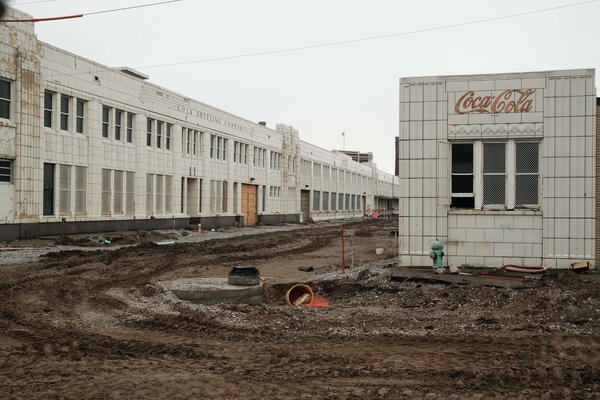Subscriber Benefit
As a subscriber you can listen to articles at work, in the car, or while you work out. Subscribe NowThe food hall planned as part of the massive Bottleworks redevelopment project on Mass Ave will get its needed alcohol permit, pending approval from Gov. Eric Holcomb.
The Indiana House and Senate approved a bill Wednesday afternoon that creates a special food hall permit meant to benefit the $300 million Bottleworks project. The House voted 83-6 and the Senate voted 40-9 to approve the legislation, which heads to Holcomb for his signature.
A similar provision died at the end of the 2018 session, and the issue became even more pressing this year because the 30,000-square-foot food hall is expected to open in summer 2020.
The bill creates a food hall three-way alcohol license for an initial fee of $50,000, plus one-, two- and three-way sub-permits for $2,500 to $5,000 each for the vendors in the food hall. (Three-way permits allow retailers to serve beer, wine and liquor.) The food hall permits—and the sub-permits—would not be counted as part of a city’s overall permit limit as long as the vendors do not occupy more than 2,000 square feet.
The costs of the permits outlined in the final version of the legislation were significantly reduced from the original version, which charged $100,000 for the three-way food hall license and $50,000 each for the sub-permits.
The Bottleworks development by Hendricks Commercial Properties will span 1.2 million square feet and include apartments and condos, as well as office, retail space, a 150-room West Elm hotel and an upscale art-house movie theater.
The food hall is expected to feature a variety of small places to eat and drink as a way to highlight new and upcoming chefs in Indianapolis.
Language that tried to address the ongoing issues with the state’s existing quota system, which caps the number of alcohol permits each community is allocated based on its population, was cut from the final version of the bill.
When a community hits its cap, the only way a business can obtain a permit is to purchase an existing one from a current permit-holder. Privately-sold alcohol permits can cost $25,000 to $90,000, depending on the community. The state typically charges $1,000 for a new permit.
The bill’s author, Republican Rep. Ben Smaltz, suggested allowing cities and towns to create “entertainment revitalization areas” that would have been allowed to obtain additional alcohol permits outside of the quota.
Cities and towns can already create Riverfront Redevelopment Districts, which allow an unlimited number of liquor licenses within 1,500 feet of a buildable river bank. As of July 2018, there were more than 250 active riverfront districts that qualified for permits.
Smaltz recommended grandfathering in the existing permits in the riverfront districts but eliminating those districts in the future and using the entertainment districts instead.
Senate lawmakers removed that provision, though.
On Wednesday, Smaltz suggested that might be an issue they revisit next year.
The bill does include a couple of provisions that could help address the permit shortage—it limits how long owners can hang on to permits they are not using while they wait for higher demand and lower supply, which allows them to sell the permits at a high price.
Smaltz has described the problem as “permit squatting.”
The final version of the bill allows an owner to hold an unused permit for two years and, if needed, request up to three, one-year extensions from the local Alcohol and Tobacco Commission. The owner would have to meet in person with the ATC to explain why an extension is needed.
The legislation also requires the ATC to track sales and publish the prices in a public database to try to shine a light on the private market, but it does not cap the prices that can be charged. Earlier versions of the bill called for such caps.
The bill at one point also would have allowed consumers to carry wine into an art-instruction studios, hair salons or restaurants The final version allows carry-in alcohol at wine-and-canvas studios, but not restaurants and hair salons.
Smaltz also added language from another bill he authored this year that would allow for sales of liquor from golf carts at golf courses—something that is technically illegal right now.
“I think we are in a pretty good spot,” Smaltz said on the House floor before the vote. “We didn’t get everything we wanted. They didn’t get everything they wanted.”
Please enable JavaScript to view this content.
